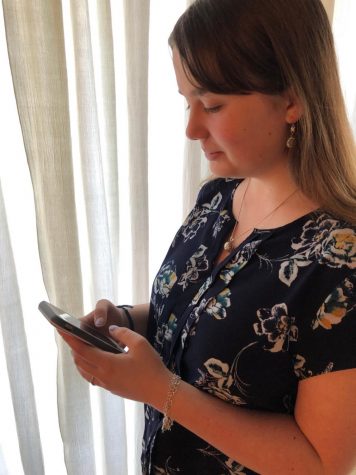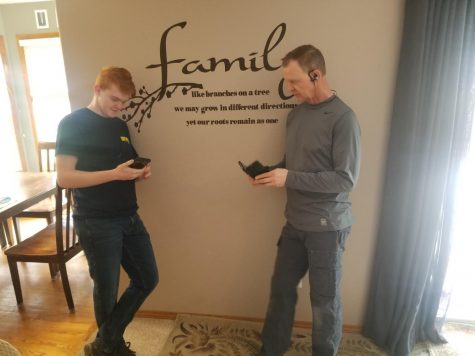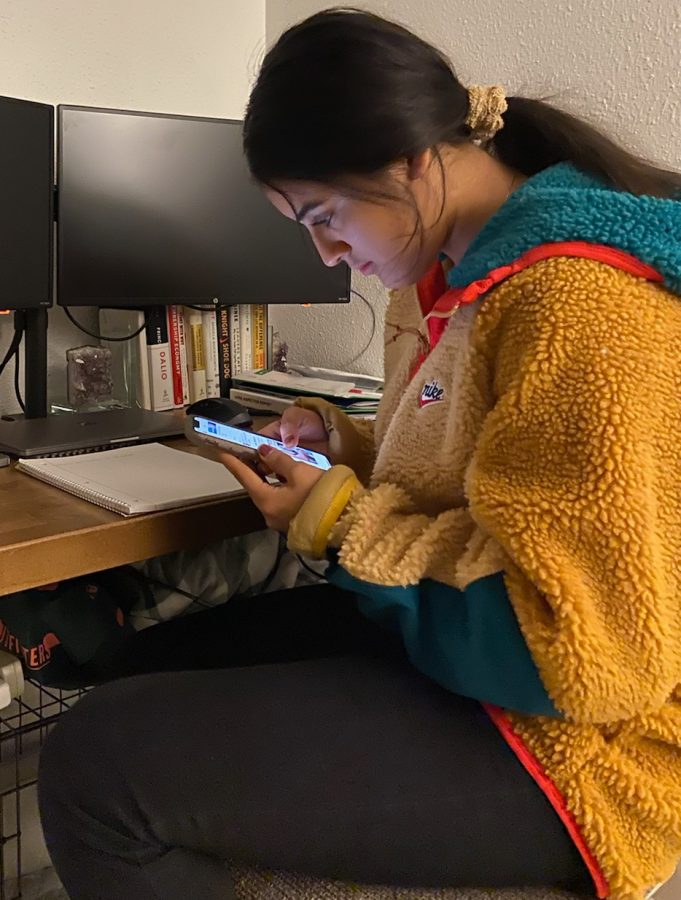Now teens worry about their screen time?
Annette Hernandez is a full IB student who knows she must limit her time on her phone because it can distract her from her studies.
April 17, 2020
Life has changed so much after writing this article. It started as an article to look at the effect of student screen time on health. Students were losing sleep playing games and going on social media at all hours. They were getting distracted by their phones when they should have been doing schoolwork or talking to friends in person. Recently, screens have helped friends communicate who have been blocked because of the coronavirus. And screens are the only way for students to do their schoolwork.
According to the 173 responders of a Tigard Teen screen time survey, 9.2% use their phones for less than a hour, 19.7% use their phone for one to two hours, 43.4% use their phone for three to four hours, 21.7% use their phones five to six hours, and 12.7% use their phones more than eight hours. The majority of all users time was spent using social media—Tik Tok, Instagram, and Snapchat—and watching videos on Youtube
Max Schimmelbusch is a freshman at Lake Oswego High School. He notices how much his peers use social media. He responded to this interview by text
“Transferring from a private to a public school was hard, at my old school there was no competition,” Schimmelbusch said.” At public school everyone wants attention, everyone craves it. I do sometimes feel like I have to compete, but that isn’t always the best way for people.”
He spends four hours a day on Instagram, Google Hangouts, listening to music, playing a few games and texting. He notices that it distracts him while he does homework, and if he keeps notifications affect him from getting enough sleep. According to Schimmelbusch, it would be hard to live without a phone because he wouldn’t be able to contact his friends or get to hear about upcoming events. From his experience public and private schools use their phones differently.
The Mayo Clinic website recommends two hours or less of screen time not counting educational purposes. Additionally, the website explains that technology is useful for those who want to stay connected and communicate with friends and family. But the website shows a video on the impacts of technology. According to the video, the ”impact of too much screen time can cause depression, obesity and sleep problems. To prevent that the doctors here recommend a variety of ways to spend your free time like activities and sports.”
Junior Muirgheal Baker is very committed to the band program, playing the trombone.

Muirgheal Baker is involved in a variety of extracurricular activities and has to schedule her time on her phone.
“I spend about 30 minutes at 6:30 texting friends and family,” Baker said. I have many kinds of electronics like Amazon Echos, computers, Ipads and a variety of Playstations.” Even with a lot of technology she is able to focus on her studies and her extra curricular activities.
Talita Pierce, a Freshman from Tualatin High School, was interviewed over text. She shared her experience of how technology affects her.
“I would say that it has caused me to procrastinate more,” Pierce said. I don’t have good time management skills, and the phone makes it worse. I like to text on my phone; I like to connect with my friends and make sure they’re doing well and help them when they aren’t.”
There are some students who are exceptions and don’t use technology as often. Full IB students are totally different with those classes and even more involvement adding onto sports. As a full IB student, Senior Annette Hernandez doesn’t have much time to be on her phone. She spends 4-5 hours finishing her homework around midnight or 1 a.m. During the time between 3-5 p.m., she takes a break on her phone but finds that sometimes she gets distracted on social media and starts homework later.
As an IB French 4 Teacher , Kathleen Williams tries to limit technology assignments to one assignment on technology for French 1 and for French 3 and 4 two to three assignments per year. For her class she suggests feeling like a lot of times people use technology as a crutch. Or they use it to find something more quickly.
“Students don’t always look at the quality of the thing, that information that they’re getting. You know, frequently using Google Translate can be helpful as a tool,” Williams said. “But when people try to use the assignment using Google Translate, they’re not actually doing the assignment. Frequently, they’re doing it incorrectly.”
Rick Peabody is the father of senior Steven Peabody who is from Mountainside High School.
“If we limited the amount of technology, yeah, then there’s less temptation,” Peabody said.
But he acknowledges all families are different; in his family, less technology helps his children like Steven to focus better. Peabody explained the philosophy in his home. He lives by Ben Franklin’s adage that “an ounce of prevention is worth a pound of cure” in trying to limit his children’s screen time.
He also shares his advice on how parents can help with phone addiction “But if somehow there’s incentive by parents or they see the benefits of doing what they know they should do. I think I think that they can, they can be great. I think that’s the dividing line between young people, teenagers that do amazing things if they don’t get caught up and all that they have balance,” Peabody said.

Steven and Rick Peabody spend time on their phones. Dad, Rick, knows that it is important use technology but also to be disciplined about it.
From the son’s point of view, Steven uses his phone approximately three hours and 30 minutes a day including Instagram, Youtube and sometimes games on the weekends.
“On the weekends it’d be a bit of a distraction, but … it’s a habit,” Steven said. “But personally, it’s not too bad.” He creates notifications that alert himself at a certain time of the day; it helps him not to be too distracted. Lastly, instead of being on his phone, he goes on bike rides and is 18 years old and still builds with Legos!
Phones have taken a new part of Teen’s life, it helps students get caught up with other’s lives. Especially in this quarantine time it would be very hard to go without phones and technology because that is the only way we can have class and even communicate with people now. In this life, phones give a lot of communication opportunities to show what is going on in life and talk without being at the same place. If people didn’t use phones it would give up more than just technology–a social life. Can a student live even without a phone?










